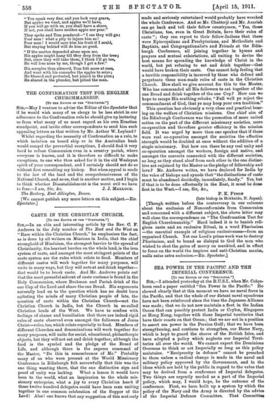CASTE IN THE CHRISTIAN CHURCH.
[To THE EDITOR OF THE "SPECTATOR."]
Sra,—In an able and interesting article by the Rev. O. F. Andrews in the July number of The East and the West on "Race within the Christian Church," he emphasises the fact, as is done by all writers on Missions in India, that the chief stronghold of Hinduism, the strongest barrier to the spread of Christianity, the heaviest burden on the whole land, is the iron system of caste, and amongst the most stringent points of the caste system are the rules which relate to food. Members of different castes will work together for many purposes, will unite in many ways, but they will note at and drink together— that would be to break caste. And Mr. Andrews points out that the most powerful solvent of caste customs is found in the Holy Communion, where Brahman and Pariah drink of the one Cup of the Lord and share the one Bread. His arguments naturally lead on to the question which has no doubt been agitating the minds of many Christian people of late, the question of caste within the Christian Church—not the Christian Church in India„ but the Church in so-called Christian lands of the West. We have to confess with feelings of shame and humiliation that there are indeed rigid rules of caste observed even amongst the followers of Jesus Christ—rules, too, which relate especially to food. Members of different Churches and denominations will work together for many purposes, will unite for social, educational, philanthropic objects, but they will not eat and drink together, although the food is the symbol and the pledge of the Bread of Life, and although there is the express command of the Master, "Do this in remembrance of Me." Probably many of us who were present at the World Missionary Conference in Edinburgh felt sorrowfully that this was the one thing wanting there, that the one distinctive sign and proof of unity was lacking. What a lesson it would have been to the world, what an inspiration to the whole mis- sionary enterprise, what a joy to every Christian heart if those twelve hundred delegates could have been seen uniting together in one common celebration of the Supper of the Lord! Alas ! one knows that any suggestion of this seriously made and seriously entertained would probably have wrecked the whole Conference. And so Mr. Cbatterji and Mr. Azariah can go back and tell their fellow countrymen, "Yes, those Christians, too, even in Great Britain, have their rules of caste " ; they can report to their fellow-Indians that there were Episcopalians and Presbyterians, and Methodists and Baptists, and Congregationalists and Friends at the Edin- burgh Conference, all joining together in hymns and prayers and mutual exhortations, all uniting to devise the best means for spreading the knowledge of Christ in the world, but yet refusing to eat and drink together—that would have broken their caste. One cannot help feeling that a terrible responsibility is incurred by those who defend and perpetuate these man-made rules of caste in the Christian Church. How shall we give account for this to the Master, Who has commanded all His followers to eat together of the one Bread and drink together of the one Cup ? How can we hope to escape His scathing rebuke, "Full well ye reject the commandment of God, that ye may keep your own tradition."
This question has obviously a very close and practical bear- ing on the welfare of Christian missions. One chief aim of the Edinburgh Conference was the promotion of more united action on the part of the different missionary societies, more co-operation and therefore greater efficiency in the mission field. It was urged by more than one speaker that if there were real co-o peration amongst the societies the effective strength would be doubled at once without the addition of a single missionary. But how can there be any real unity and co-operation amongst the workers, foreign and native, and amongst the converts connected with the different societies, so long as they stand aloof from each other in the one distinc- tive act enjoined by the Master as the pledge of fellowship and love P Mr. Andrews writes, we have declared for India by the voice of bishops and synods that " the distinctions of caste must be abandoned decidedly, immediately, finally." Yes, but if that is to be done effectually in the East, it must be done first in the West.—I am, Sir, &c.,
P. K. FYSON
(late bishop in Hokkaido, N. Japan).
[Though written before the controversy in our columns about the exclusion of Nonconformists from Communion and concerned with a different subject, the above letter may well close the correspondence on "The Confirmation Test for English Churchmanship." Hard indeed it is to banish reli- gious caste and an exclusive Ritual, in a word Pharisaism —the essential example of religious exclusiveness—from an organised Church. Yet our Lord's prime work was to destroy Pharisaism, and to brand as disloyal to God the men who wished to shut the gates of mercy on mankind, and in effect to force on the world the impious and anti-Christian maxim, nulla scam extra ecelesiant.—ED. Spectator.]




































 Previous page
Previous page